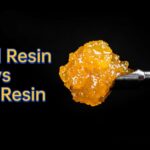THCa, or tetrahydrocannabinolic acid, is the non-psychoactive precursor to THC found in raw, unheated cannabis plants. Unlike THC, which produces the “high” associated with marijuana use, THCa does not produce any intoxicating effects. However, when exposed to heat (such as when smoking, vaporizing, or cooking with cannabis), THCa is converted into THC through a process called decarboxylation.
If you’ve consumed products containing THCa, either through ingesting raw cannabis or by using THCa-rich products like gummies or oils, you may be wondering how long it stays in your system and if it could potentially cause you to fail a drug test. In this article, we’ll explore the factors that influence THCa’s duration in your body, as well as provide tips for flushing it out of your system if needed.

Contents
Factors Affecting THCa Detection Times
The length of time that THCa remains detectable in your system can vary based on several factors, including:
1. Frequency and Amount of THCa Consumption
Like THC, the more frequently and in higher amounts you consume THCa, the longer it will take to be eliminated from your body. Occasional or one-time use of THCa products may only be detectable for a few days, while regular or heavy use can result in THCa metabolites remaining in your system for weeks or even months.
2. Metabolism and Body Composition
Your individual metabolism and body composition can play a significant role in how quickly THCa is processed and eliminated. In general, those with a faster metabolism and lower body fat percentage will metabolize and excrete THCa more rapidly than those with a slower metabolism and higher body fat. This is because THCa and its metabolites can be stored in fat cells, which can act as a reservoir and slowly release the compounds back into the bloodstream over time.
3. Hydration and Exercise Levels
Staying well-hydrated and engaging in regular exercise can help flush THCa and its metabolites out of your system more quickly. Both increased water intake and physical activity can promote more frequent urination and sweat, which are two primary routes of elimination for THCa and its byproducts.
4. Method of Consumption
The way you consume THCa can also affect its detection time. Products that are ingested orally, such as THCa gummies or oils, tend to have a slower absorption rate and may take longer to be fully metabolized and eliminated compared to inhaled forms like vaporized THCa concentrates.
How Long Does THCa Stay in Your System
Unfortunately, there is no definitive timeline for how long THCa remains detectable in your system, as it can vary significantly based on the factors mentioned above. However, here are some general estimates:
- Occasional Use: For those who consume THCa products only occasionally, it may be detectable in urine for 3-7 days after the last use.
- Regular Use: With regular or frequent THCa consumption, it could potentially be detected in urine for up to 30 days or longer after the last use.
- Heavy Use: For heavy, daily users of THCa products, it may take up to 90 days or more for THCa to become completely undetectable in the body.
It’s important to note that these are rough estimates, and individual experiences may vary. Additionally, detection times can differ based on the type of drug test being used (e.g., urine, blood, hair, or saliva).
How to Flush THCa Out of Your System
If you need to flush THCa out of your system quickly, there are several strategies you can try:
1. Increase Water Intake
Drinking plenty of water can help dilute your urine and promote more frequent urination, which can help eliminate THCa metabolites from your body more quickly. Aim for at least 8-10 glasses of water per day, and consider adding lemon or cranberry juice, which can further aid in flushing out toxins.
2. Exercise Regularly
Regular exercise can help burn fat cells, which can release stored THCa metabolites back into the bloodstream for elimination. Aim for a combination of cardio and strength training exercises to maximize fat burning and sweat production.
3. Consume a Fiber-Rich Diet
Eating a diet high in fiber can help promote regular bowel movements, which is another route for eliminating THCa and its byproducts from your system. Good sources of fiber include fruits, vegetables, whole grains, and legumes.
4. Consider Detox Products (with Caution)
There are various detox products on the market, such as drinks, pills, and kits, that claim to help flush THCa and other toxins out of your system more quickly. However, the effectiveness of these products is often questionable, and some may even contain potentially harmful ingredients. If you decide to try a detox product, be sure to research it thoroughly and consult with a healthcare professional first.
5. Time It Out
If you have the luxury of time, the most reliable method for clearing THCa from your system is simply to abstain from using THCa products and allow your body to naturally metabolize and eliminate the remaining compounds over time.
Final Thoughts
While THCa itself is non-psychoactive and generally considered safe for consumption, it can still potentially cause you to fail a drug test due to its conversion to THC when heated. If you need to pass a drug test and have recently consumed THCa products, it’s essential to be aware of the factors that can influence detection times and take appropriate steps to help flush it out of your system more quickly.
Remember, the most foolproof way to avoid failing a drug test is to abstain from consuming any form of THC or THCa products. However, if you do find yourself in a situation where you need to clear THCa from your system, following the tips outlined in this article can help increase your chances of success.
Ultimately, it’s essential to be proactive, informed, and responsible when it comes to consuming cannabis products, especially if you are subject to drug testing. Stay safe, stay informed, and make choices that align with your personal and professional goals.
FAQS
Does THCa Show Up in Drug Tests?
Yes, THCa can potentially show up on drug tests, although it is not directly tested for. When consumed, THCa is converted into THC through a process called decarboxylation, which can occur through heating or exposure to certain chemicals. Most standard drug tests are designed to detect the presence of THC and its metabolites, which are formed after THCa is converted to THC in the body.
While THCa itself is not psychoactive and does not produce a “high,” it can still lead to a positive drug test result if it has been converted to THC. This means that consuming products containing THCa, such as raw cannabis or THCa-infused edibles, can potentially cause you to fail a drug test, even if you did not directly consume THC.
It’s important to note that the detection window for THCa-derived THC can vary based on factors such as frequency of use, metabolism, and body composition. Occasional or infrequent use may only be detectable for a few days, while chronic or heavy use could potentially be detected for several weeks or even months after the last consumption.
What is Considered a High THCa Percentage?
There is no definitive threshold for what is considered a “high” THCa percentage, as it can vary depending on the specific cannabis strain and growing conditions. However, in general, a THCa percentage above 20-25% is considered quite potent, especially for raw, unheated cannabis.
It’s important to note that THCa percentages are often listed on cannabis product labels alongside the THC percentage. This is because, during the testing process, some of the THCa may have been converted to THC through decarboxylation, resulting in a mixture of both compounds being present in the final product.
When evaluating the potency of a cannabis product, it’s generally recommended to look at the combined total of THCa and THC, as this represents the maximum potential THC content once the THCa has been fully converted through heating or other decarboxylation methods.
How Does THCa Affect the Body?
Unlike THC, which is the primary psychoactive compound in cannabis, THCa itself does not produce any intoxicating or mind-altering effects. This is because THCa is a precursor to THC and lacks the chemical structure necessary to bind to the cannabinoid receptors in the brain and body that are responsible for the “high” associated with THC.
However, research suggests that THCa may have potential therapeutic benefits, particularly as an anti-inflammatory and neuroprotective agent. Some studies have indicated that THCa may have the ability to reduce inflammation, which could be beneficial for conditions such as arthritis, Crohn’s disease, and multiple sclerosis.
Additionally, THCa has been shown to have potential neuroprotective properties, meaning it may help protect brain cells from damage or degeneration. This could have implications for conditions like Alzheimer’s disease, Parkinson’s disease, and other neurodegenerative disorders.
It’s important to note that while these potential benefits of THCa are promising, more research is still needed to fully understand its effects on the human body and to determine appropriate dosages and delivery methods.
How Far Back Does a 10-Panel Urine Test Go?
A 10-panel urine drug test is designed to detect the presence of various substances, including THC metabolites, in an individual’s system. The detection window, or the amount of time that these substances can be detected, can vary depending on several factors, such as:
1. Frequency and amount of use
2. Metabolism and body composition
3. Hydration levels
4. Type of substance being tested for
For THC metabolites, which are formed after the body metabolizes THC from cannabis consumption, a 10-panel urine test can typically detect their presence for the following approximate timeframes:
· Single use: Up to 3-7 days
· Moderate use (a few times per week): Up to 10-15 days
· Chronic or heavy use (daily): Up to 30 days or longer
It’s important to note that these detection windows are just estimates and can vary significantly based on the individual’s unique physiology and patterns of use. Additionally, some advanced testing methods or hair follicle tests may be able to detect substances for an even longer period of time, potentially up to several months.
If you are concerned about passing a drug test, it’s always best to abstain from any substance use for an extended period before the test to ensure that your system is clear of any detectable metabolites.






